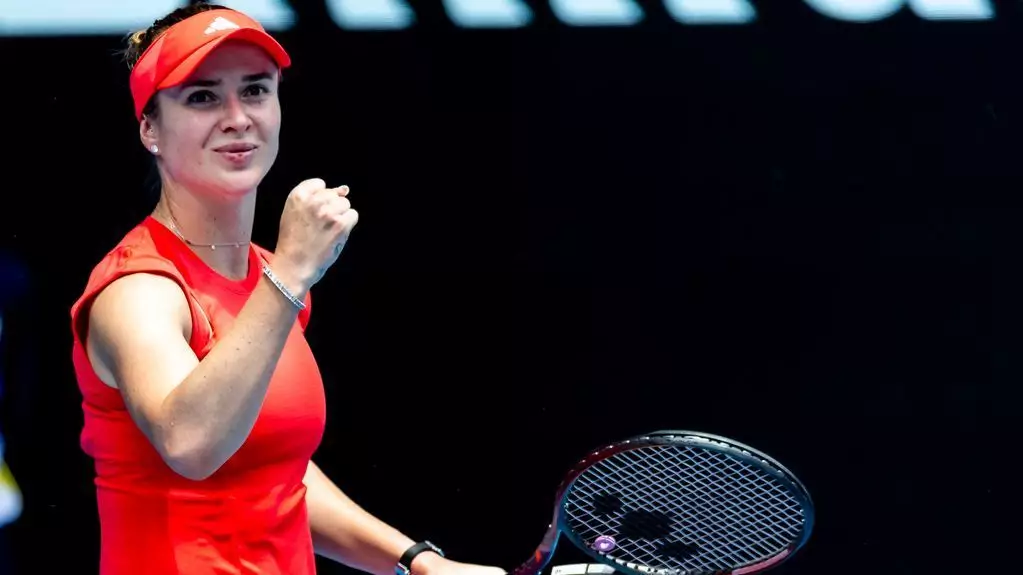Elina Svitolina’s remarkable journey at the Australian Open this year is a compelling narrative of resilience and tenacity. Facing Veronika Kudermetova in a thrilling fourth-round match, Svitolina—ranked as the 28th seed—found herself at a significant disadvantage early on, trailing 4-1. However, the Ukrainian player turned the tide with an impressive performance, winning 11 of the next 12 games to secure a 6-4, 6-1 victory, marking her return to the quarterfinals for the first time since 2019. This victory not only reflects her skill on the court but also encapsulates her journey through personal changes and professional challenges.
Svitolina’s journey to this stage of the Grand Slam has been anything but straightforward. Since reaching the quarterfinals in 2019, the 30-year-old Ukrainian has navigated significant life changes, including her marriage to French player Gael Monfils in 2021 and the birth of their daughter, Skai, in 2022. These experiences have undoubtedly contributed to her growth as both an athlete and an individual. In her own words, it “feels like a lifetime ago” since she last enjoyed this level of success in Australia. Her ability to refocus and reclaim her place among the tournament’s elite speaks volumes about her mental fortitude and determination.
Svitolina’s match against Kudermetova showcased her extraordinary ability to adapt under pressure. After suffering two early service breaks, she shifted her mindset and committed to simply “fighting” for every point. This dedication is a testament to her competitive spirit and her unwavering resolve. “It’s the only thing I can do when things are not going your way,” she reflected, highlighting the importance of perseverance in moments of adversity. This mentality is particularly significant in high-stakes matches where the psychological battle often complements physical prowess.
The match also highlighted Svitolina’s tactical acumen. While she certainly possesses the power to dominate opponents, her strategy against Kudermetova illustrated a blend of finesse and aggression. Her calculated use of drop shots and lobs drew Kudermetova to the net, demonstrating her ability to exploit weaknesses in her opponent’s game. The absence of a handshake post-match, while notable, reflected their respective national backgrounds and the complexities of sportsmanship in today’s climate—an aspect of the modern sporting narrative that adds depth to the game.
Moving forward, Svitolina’s next challenge is against Madison Keys, another formidable competitor who recently claimed victory over Elena Rybakina, a former Wimbledon champion. Keys’ current nine-match winning streak underscores her own resurgence in the sport. Their upcoming clash promises to be a highlight of the tournament, as both players mix tenacity with experience. Keys’ savvy performance against Rybakina, especially in neutralizing her opponent’s serve, will present a fresh challenge for Svitolina.
As the stakes climb higher, Svitolina’s presence in the quarterfinals is not only a significant personal achievement but also a source of inspiration for many. Her message of resilience, evidenced by a heartwarming tribute to her homeland—”The Spirit of Ukraine”—drawn on a camera lens—has resonated with fans worldwide. The imagery of the red attire she wore during her match echoed her determination and solidarity, reminding everyone of her dual identity as both a proud athlete and a mother who has embraced the complexities of life beyond tennis.
Elina Svitolina’s return to form at the Australian Open is a powerful narrative of hope and determination. As she approaches this pivotal quarterfinal match, fans and supporters alike will be eager to witness whether her journey continues to unfold in spectacular fashion. Her story exemplifies not just athletic prowess but a human spirit attuned to resilience and triumph amidst challenges.

